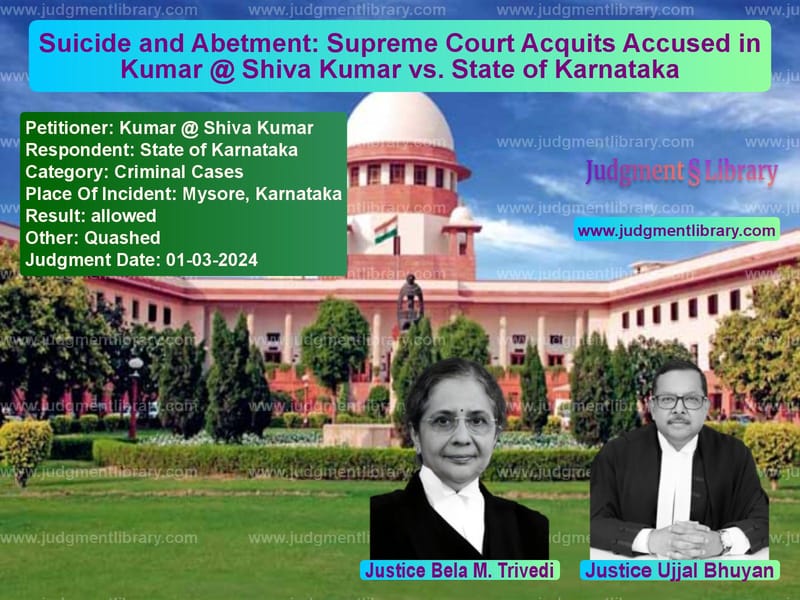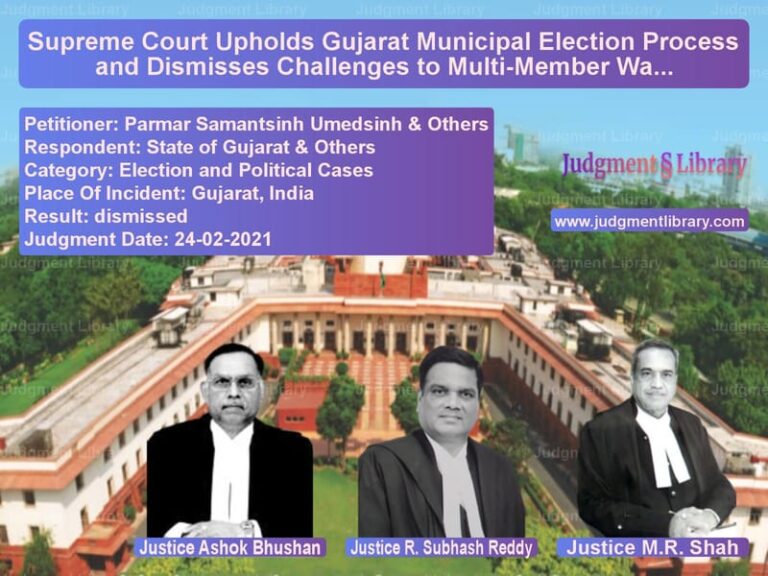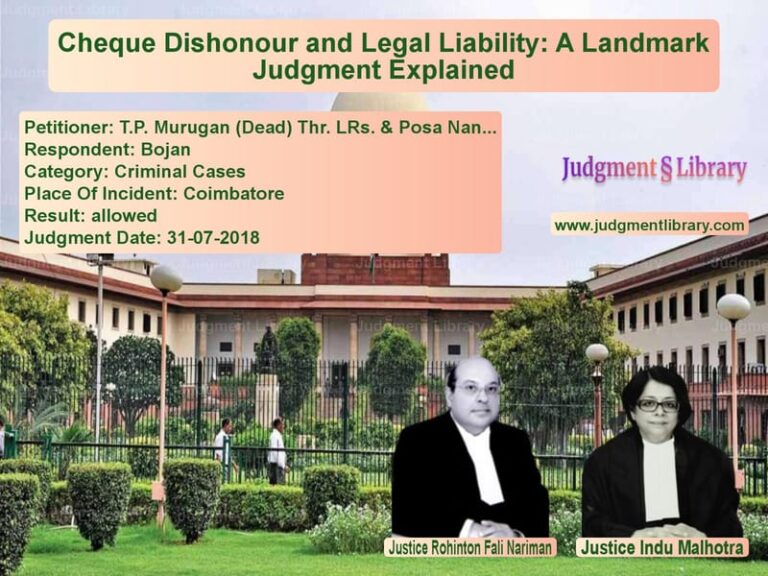Suicide and Abetment: Supreme Court Acquits Accused in Kumar @ Shiva Kumar vs. State of Karnataka
The Supreme Court of India has recently delivered a crucial judgment in the case of Kumar @ Shiva Kumar vs. State of Karnataka, setting aside the conviction of the appellant under Section 306 of the Indian Penal Code (IPC) for abetment of suicide. This case revolved around allegations that the appellant had harassed the deceased and instigated her to take her own life. However, after reviewing the evidence in detail, the Supreme Court found that the prosecution had failed to establish beyond reasonable doubt that the appellant had abetted the suicide.
Background of the Case
The case originates from an incident that took place on July 5, 2000, in Mysore, Karnataka. The prosecution alleged that the appellant, Kumar @ Shiva Kumar, had previously lived as a tenant in the deceased’s house. On the day of the incident, he allegedly threatened and harassed the deceased, coercing her to marry him. When she refused, the appellant allegedly threatened to harm her family. Following this altercation, the deceased consumed poison and was later admitted to the hospital, where she succumbed to the effects of poisoning on July 6, 2000.
Subsequently, the deceased’s father lodged a police complaint against the appellant, alleging that he was responsible for his daughter’s suicide. The police registered a case under Section 306 IPC (abetment of suicide). After investigation, the trial court convicted the appellant and sentenced him to three years of rigorous imprisonment along with a fine of ₹2,000. The Karnataka High Court upheld this conviction, prompting the appellant to file an appeal before the Supreme Court.
Key Issues Before the Supreme Court
- Whether the prosecution had presented sufficient evidence to prove abetment of suicide beyond a reasonable doubt.
- Whether the statements of the prosecution witnesses were consistent and reliable.
- Whether the legal definition of “instigation” and “abetment” under Section 306 IPC was fulfilled in this case.
- Whether the appellant’s alleged actions had a direct and proximate connection to the deceased’s suicide.
Arguments by the Petitioner (Kumar @ Shiva Kumar)
The appellant’s defense counsel raised several critical arguments:
- There were significant contradictions in the statements of prosecution witnesses, especially family members of the deceased.
- The deceased had never lodged a prior complaint about harassment by the appellant.
- The prosecution failed to establish that the appellant had instigated or coerced the deceased into committing suicide.
- The delay in lodging the First Information Report (FIR) raised doubts about the authenticity of the allegations.
- The medical evidence, including the autopsy report, did not conclusively establish that the appellant was responsible for the deceased’s mental distress.
Arguments by the Respondent (State of Karnataka)
The State argued that:
- The deceased had clearly communicated to her family that the appellant was harassing her and pressuring her to marry him.
- The threats issued by the appellant were serious enough to drive the deceased to suicide.
- Multiple witnesses, including the deceased’s family members, had testified about the mental distress suffered by the deceased due to the appellant’s actions.
- The chain of events, starting from the appellant’s harassment to the deceased consuming poison, established a direct link between the accused’s actions and the suicide.
Supreme Court’s Observations
After examining the facts and evidence, the Supreme Court made the following key observations:
“The evidence on record, as noted above, not only reveals glaring inconsistencies but also gaping holes in the version of the prosecution. That apart, there are material omissions too.”
The Court further observed that:
“To constitute ‘instigation,’ a person must provoke, incite, urge, or encourage another to commit an act. A word uttered in a fit of anger or emotion without intending the consequences to actually follow cannot be said to be instigation.”
The Court also pointed out the following inconsistencies:
- The deceased’s father and sister provided conflicting statements about when they last spoke to the deceased.
- The neighbors who allegedly saw the deceased collapsing from poisoning were not examined thoroughly.
- The medical reports showed multiple injection marks and healed injuries, but no clear evidence linking them to the appellant’s actions.
- No concrete evidence was presented to prove that the appellant’s threats directly pushed the deceased to commit suicide.
Final Judgment
Based on its analysis, the Supreme Court set aside the conviction and acquitted the appellant. The key points in the ruling were:
- The prosecution failed to prove the charge of abetment beyond a reasonable doubt.
- The evidence was insufficient to establish that the appellant had “instigated” or “aided” the suicide.
- Significant contradictions in witness statements and a lack of direct evidence weakened the prosecution’s case.
- The mere existence of harassment, without a clear link to the suicide, is not sufficient to convict someone under Section 306 IPC.
- The appellant was already on bail, and the Supreme Court discharged his bail bonds.
Implications of the Judgment
This ruling reinforces the principle that mere allegations of harassment are not enough to convict someone under Section 306 IPC. The prosecution must establish a clear and direct link between the accused’s actions and the suicide. The judgment highlights that courts must carefully scrutinize witness statements and medical evidence before upholding convictions in suicide-related cases.
With this verdict, the Supreme Court has reiterated the necessity of proving mens rea (guilty intent) in abetment of suicide cases. The judgment is expected to serve as an important precedent in similar cases where the charge of abetment of suicide is based on circumstantial evidence.
Petitioner Name: Kumar @ Shiva Kumar.Respondent Name: State of Karnataka.Judgment By: Justice Bela M. Trivedi, Justice Ujjal Bhuyan.Place Of Incident: Mysore, Karnataka.Judgment Date: 01-03-2024.
Don’t miss out on the full details! Download the complete judgment in PDF format below and gain valuable insights instantly!
Download Judgment: kumar-@-shiva-kumar-vs-state-of-karnataka-supreme-court-of-india-judgment-dated-01-03-2024.pdf
Directly Download Judgment: Directly download this Judgment
See all petitions in Suicide Cases
See all petitions in Judgment by Bela M. Trivedi
See all petitions in Judgment by Ujjal Bhuyan
See all petitions in allowed
See all petitions in Quashed
See all petitions in supreme court of India judgments March 2024
See all petitions in 2024 judgments
See all posts in Criminal Cases Category
See all allowed petitions in Criminal Cases Category
See all Dismissed petitions in Criminal Cases Category
See all partially allowed petitions in Criminal Cases Category







